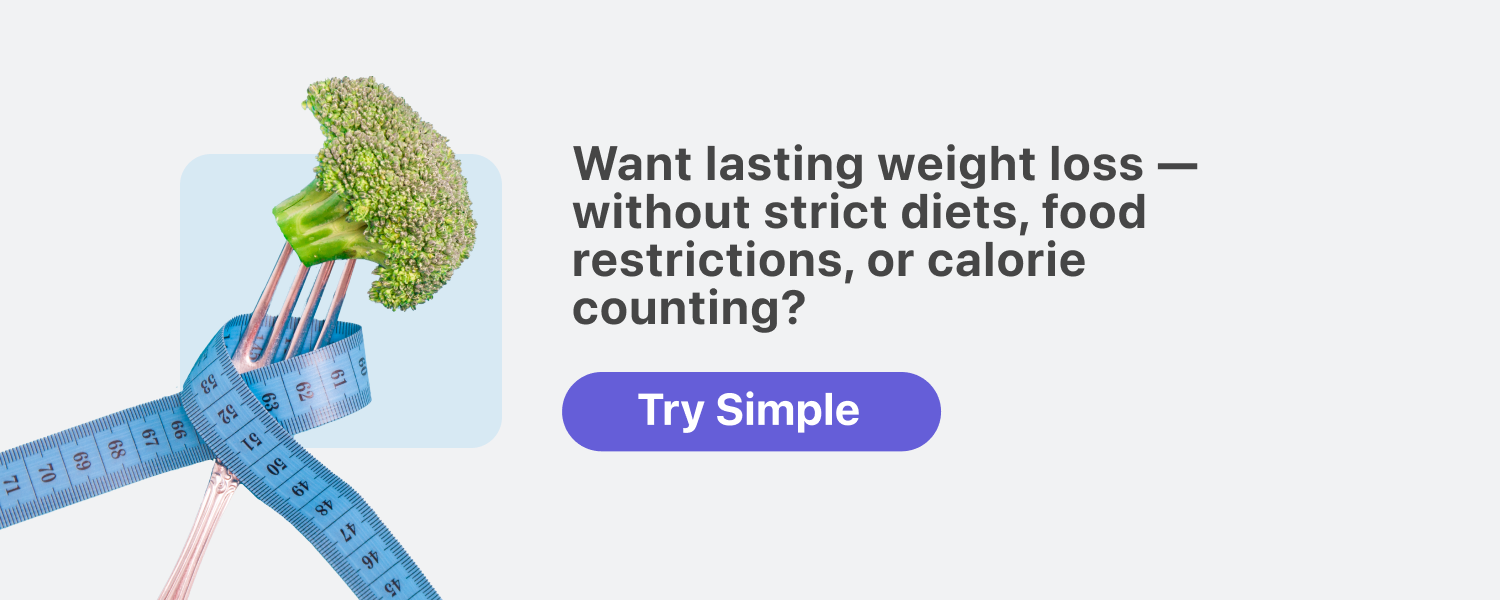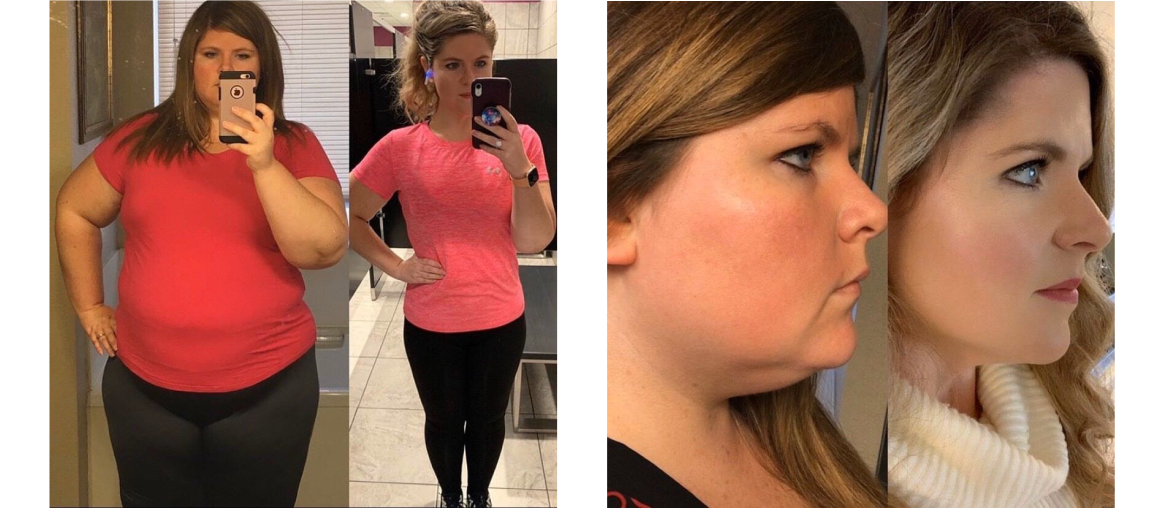Intermittent fasting results: Simple’s weight loss journey

Thousands of people trying to lose weight are frustrated by traditional diets that don’t work — or work only for a short time before the weight comes back. Health blogs and magazines tell us to cut calories and “watch what we eat.” Some promote restrictive diets that ban certain foods … or even entire food groups.
The result: People trying to lose weight end up trapped in a “yo-yo dieting” cycle. They lose weight. Regain it. Then diet again. Over and over and over.

Intermittent fasting can break that cycle and lead to better results because it’s not a traditional diet. It’s a lifestyle transformation.
If that yo-yo life sounds familiar to you, and you’re ready to discover a new way to tackle weight loss and improve your health and well-being, read on!
How much weight can you lose with intermittent fasting?
Everyone is different. The amount of body weight you can lose through intermittent fasting depends on lots of factors like:
- your starting weight
- your overall health
- your food intake type and amount
- your lifestyle
- your age
- your activity level
… and so on.
However, in general, studies have shown that intermittent fasting is an effective way to lose weight. And there are other benefits — a large research review in the Journal of the American Medical Association found that intermittent fasting is linked not only to successful weight loss but also to a healthier metabolism.[1]
(Of course, one of the most effective ways to lose weight — and keep it off — is to pair intermittent fasting with healthy eating. Check out our “What to eat during intermittent fasting guide” for more ideas on how to make that happen.)

Does weight loss vary based on gender?
Both men and women can lose weight with intermittent fasting, but weight loss results can vary based on gender because fasting doesn’t affect men and women in the same way.[2] There are differences in how male and female bodies respond to going without food for periods of time.
For instance, fasting can raise women’s cortisol levels.[3] Higher levels of cortisol can increase cravings. Increased cravings can make fasting harder to sustain and increase the possibility of overeating, which can then reduce weight loss.
Despite these differences, intermittent fasting can help both men and women lose weight, so long as they use the right schedules and techniques for their needs.
Intermittent fasting leads to better results for women if they start slowly with shorter fasts and work up to longer fasts over time. This allows for a more gentle calorie cut and gives the body time to adjust.
Does weight loss vary based on age?
There’s no evidence to say that age makes any difference to how effective intermittent fasting is for weight loss.
Research tells us that, when it comes to weight loss, intermittent fasting can lead to results for adults of all ages.[4]
That said, different fasting schedules will work better at different stages of life. Finding the one that suits your lifestyle has a huge impact on the weight loss results you’ll get — a poor fit will lead to less consistency in following the schedule, and less consistency leads to fewer results!
We also don’t encourage fasting for anyone who is under the age of 18 or 80 years old or more. Check out our guide to intermittent fasting at every age for help with choosing the right schedule for you, whatever age or stage you’re at.
Is exercise necessary?
Regular, effective, safe, and enjoyable exercise can certainly speed up the results of intermittent fasting and increase the health benefits you’ll experience across the board.[5]
We go into this in-depth in our guide to intermittent fasting and working out, but here are a couple highlights:
- Cardio training can help you burn more calories, drop body fat, get a smaller waist circumference, improve your stamina, and manage your hunger and cravings.[6,7,8]
- Strength training can help you lose fat, increase your metabolic rate (so you burn more calories), manage your appetite, and both build and preserve muscle.[8,9,10,11]
Each one of these things is valuable to anyone wanting to lose weight and improve their metabolic health. If you’re intermittent fasting and you want to see more progress, adding exercise can help.
Intermittent fasting before and after results
This is Teresa. After hitting 50, Teresa felt it was time to put losing weight, boosting energy, and improving her health at the top of her to-do list. Teresa loved how the Simple app made weight loss simple. She’s dropped 10 lb in her first couple of months, lost belly fat, and feels great.

“I’ve lost a pant size; my clothes are loose. I have more energy, more mental clarity — so many good things!”
If this intermittent fasting before and after inspires you, let’s get you on your way to your own success story. Tell us about your goals in our Simple quiz. We’ll help you shift your fasting game into gear, steer you on what to eat, and help you get moving.
Why should you try intermittent fasting?
Because you might like it! And because intermittent fasting has a reliable track record of health benefits that could bring extra health, vitality, and feel-goods to your life. For instance, fasting can:
- help you reduce your blood pressure, improve your insulin resistance, and lower your cholesterol
- bring you better mental clarity and more energy [12]
- get you feeling confident about your body, comfortable with your weight, and in control of what you eat
Intermittent fasting has done all these things for Simple users. Could it be a winner for you, too?
How long does it take intermittent fasting to work?
That all depends on what you mean by “work.” Weight loss results, for instance, may take a different amount of time than non-scale victories like feeling less bloated or lowering your cholesterol.
It also depends on who you are and how you live. Your age, gender, medical conditions, what you eat, how active you are, your stress levels, and so on all play a role in the speed of your fasting results.
And, it depends on how you fast. How long your fasts are, how consistently you do them, how well you do them, etc., all make a difference in how swiftly your results show up.
Now that we’ve done the whole “it depends” thing, let’s look at some ballpark numbers to see what’s realistic.
Can intermittent fasting lead to results in one month?
For sure! In the first 30 days, intermittent fasting can lead to results like improvements in your sugar and fat metabolism, hormone levels, and sleep,[13] plus benefits to your cardiovascular health.[14]
Looking a little longer term, you can make significant inroads into losing weight and dropping body fat:
- Research shows it can take anywhere from two to ten weeks to lose between 7 and 11 lb on intermittent fasting.[15] That’s about 1 lb a week — a steady, safe, and sustainable rate of weight loss.
- Women who were overweight or living with obesity fasted for six months and lost 4% to 7% of visceral fat (aka belly fat that sits around your abdominal organs).[16]
If you’re curious about how intermittent fasting can improve your health one, three, or six months from now and the results you could see whether you’re female or male, check out our guide on how long it takes for intermittent fasting to work.
Why you may not see results
If results are slow in showing up, you might wonder what’s happening. Good news: it’s normal! Don’t worry. You likely just need to make a few small changes.
- Track what you eat. The Simple app makes it easy to do this. And, when you log your meals, we’ll give you feedback and recommendations to improve the balance of your food choices (check out our Nutrition Scores food feedback system here!). Even when you’re fasting diligently, it’s still easy to eat just a little bit too much and blow your calorie deficit. Even a day or two of tracking can give you valuable insights into how to change that.
- Choose less processed foods. Think fruits and vegetables, lean proteins, whole grains, beans and legumes, nuts and seeds, and so on. In the Simple app, you’ll meet Avo, your personal wellness assistant. Avo’s available 24/7 to give you instant ideas for healthier meals and snacks — all you gotta do is ask!
- Drink lots of water. (And watch your calorie-containing drink intake at other times.) Hydration helps you feel full and satiated, and it’s easy to mistake thirst for hunger. (Check out our guide for more ideas of what you can drink while fasting.)
- Review your mindset. It’s easy to think of the eating window as a feast (“fasting and feasting” is a common — but not super helpful — frame to describe intermittent fasting). Notice how you perceive your eating window — is it a time when you can “eat whatever you want?” If so, try flipping that to connect up the idea of making wise food choices to nourish your body and support the gains you’ve made while fasting.
Things to consider before you start
#1 Choose your intermittent fasting schedule
First things first — what intermittent fasting schedule would you like to try? Check out our intermittent fasting for beginners guide to find out which might fit you best.
#2 Set your eating window up for success
Meal planning is one of the most useful habits you can have if you want to lose weight and get healthier by improving your nutrition. To make sure your eating window supports your goals, learn how to meal plan like a pro.
#3 Know what to watch out for
When embarking on a new adventure, any savvy traveler needs to get the lay of the land — particularly learning where the potential pitfalls and side effects are. Let us give you a leg up with this guide to intermittent fasting mistakes.
What’s the best schedule for weight loss?
Surprise! There’s no one “best” way. Instead, the best intermittent fasting schedule for you is the one that you can stick with.
For instance, you might want a longer or shorter fast. A fast at different times of the day. Everyday fasting or fasting less often. It’s up to you! (That’s the beauty of intermittent fasting.)
At Simple, we like time-restricted eating (TRE). These are the schedules that have a fasting period and eating window every day, like intermittent fasting 16:8, where you fast for 16 hours and eat all of your day’s food within eight hours. TRE schedules give good results and are generally low risk.
We don’t recommend fasting schedules that restrict your calorie intake to a very low amount, like OMAD, the 5:2 diet, or Eat Stop Eat. They ramp up the likelihood of nutritional deficiencies and make it harder to eat in a way that supports your body’s well-being.
If you’re struggling to pick through these options to determine which one is for you, let us take the load off. Take our Simple quiz, and we’ll recommend a schedule that suits your needs so you can get started with less stress.

Losing weight vs. losing fat: what’s the difference?
It can be exciting when you begin fasting and watch the scale numbers start dropping. (Woohoo!) But the scale doesn’t tell you what kind of weight you’ve lost.
Most people want to lose fat, not muscle mass or water. A slow and steady weight loss journey with intermittent fasting means you’re more likely to lose body fat while maintaining the muscle that keeps you strong.
Tracking your progress using before and after photos can help you see more clearly the kind of weight you’re losing on your intermittent fasting journey. For more on this, check out:
Lessons from Krystal’s intermittent fasting weight loss journey

Krystal is a Simple user who learned a lot along her fasting journey. Here are her top three tips.
Tip 1: Choose your best schedule — not someone else’s
Krystal experimented with various schedules until she found the right one. And she stays flexible. This helps her align intermittent fasting with everyday changes in her schedule.
“I alternate what kind of fasting I do. Sometimes, I stick with a traditional 16:8 fasting period and other times, I will do a longer time frame.
Her advice for beginners is this: “Start slow! Build up to longer fasts. Fasting is a muscle you have to exercise and grow. Challenge yourself, but stop when your body is ready!”
Tip 2: Use credible information
Not all the information you find online can be trusted. Poorly informed or false sources can give intermittent fasting a bad rep, which Krystal felt firsthand.
“The biggest challenge is probably other people’s perceptions of fasting and overcoming the idea that not eating is dangerous or an eating disorder,” said Krystal. “I’ve found that having information about why I do what I do helps me stay focused.”
At Simple, we couldn’t agree more, which is why all our blog and in-app content is expert-approved and backed by science — information you can trust.
Tip 3: Keep track of your health
Whether tracking your habits in your Simple app or getting regular checkups with your doctor, keep track of how your weight and health indicators change.
You’ll likely discover some non-scale victories (NSVs) that are worth celebrating, too!
“I had my annual checkup a couple of months ago and did blood work,” explains Krystal. “I’m in perfect health!”
Having this kind of confirmation can help you stay motivated and confident in the choices you’re making.

Important and final note: Intermittent fasting may not be for you, especially if you are under the age of 18 or over 80, pregnant, underweight, have a history of or an active eating disorder, take any medications, or have anemia. We recommend that you speak with your doctor and get their medical advice before making any changes to your eating habits and lifestyle.
A safe rate of weight loss is 1–2 lb a week,[17] so between four and eight pounds is possible, practical, and sustainable in a month with intermittent fasting.
16 hours is the magic number for fasting for some people. For others, it’s 14 or 18 or 12. Sixteen hours is a very common length of fast, and it’s been studied possibly more than others, so we have a lot of data on it. But there’s nothing magic about it. It’s just a number of hours that help people comfortably cut sufficient calories from their day, and it’s easier to get into ketosis (where you burn fat for fuel) if you fast for 16–18 hours.
- Patikorn C, Roubal K, Veettil SK, Chandran V, Pham T, Lee YY, et al. Intermittent Fasting and Obesity-Related Health Outcomes: An Umbrella Review of Meta-analyses of Randomized Clinical Trials. JAMA Netw Open. 2021 Dec 1;4(12):e2139558.
- Williams RL, Wood LG, Collins CE, Callister R. Effectiveness of weight loss interventions–is there a difference between men and women: a systematic review. Obes Rev. 2015 Feb;16(2):171–86.
- Cienfuegos S, Corapi S, Gabel K, Ezpeleta M, Kalam F, Lin S, et al. Effect of Intermittent Fasting on Reproductive Hormone Levels in Females and Males: A Review of Human Trials. Nutrients [Internet]. 2022 Jun 3;14(11).
- Welton S, Minty R, O’Driscoll T, Willms H, Poirier D, Madden S, et al. Intermittent fasting and weight loss: Systematic review. Can Fam Physician. 2020 Feb;66(2):117–25.
- Kotarsky CJ, Johnson NR, Mahoney SJ, Mitchell SL, Schimek RL, Stastny SN, et al. Time-restricted eating and concurrent exercise training reduces fat mass and increases lean mass in overweight and obese adults. Physiol Rep. 2021 May;9(10):e14868.
- Alberga AS, Prud’homme D, Kenny GP, Goldfield GS, Hadjiyannakis S, Gougeon R, et al. Effects of aerobic and resistance training on abdominal fat, apolipoproteins and high-sensitivity C-reactive protein in adolescents with obesity: the HEARTY randomized clinical trial. Int J Obes . 2015 Oct;39(10):1494–500.
- Lemes ÍR, Turi-Lynch BC, Cavero-Redondo I, Linares SN, Monteiro HL. Aerobic training reduces blood pressure and waist circumference and increases HDL-c in metabolic syndrome: a systematic review and meta-analysis of randomized controlled trials. J Am Soc Hypertens. 2018 Aug;12(8):580–8.
- Broom DR, Batterham RL, King JA, Stensel DJ. Influence of resistance and aerobic exercise on hunger, circulating levels of acylated ghrelin, and peptide YY in healthy males. Am J Physiol Regul Integr Comp Physiol. 2009 Jan;296(1):R29–35.
- Wewege MA, Desai I, Honey C, Coorie B, Jones MD, Clifford BK, et al. The Effect of Resistance Training in Healthy Adults on Body Fat Percentage, Fat Mass and Visceral Fat: A Systematic Review and Meta-Analysis. Sports Med. 2022 Feb;52(2):287–300.
- Westcott WL. Resistance training is medicine: effects of strength training on health. Curr Sports Med Rep. 2012 Jul-Aug;11(4):209–16.
- Bhutani S, Varady KA, Klempel MC, Kroeger CM. Alternate day fasting combined with exercise: An effective treatment for weight loss and cardio‐protection in obese humans. FASEB J [Internet]. 2012 Apr;26(S1).
- Ooi TC, Meramat A, Rajab NF, Shahar S, Ismail IS, Azam AA, et al. Intermittent Fasting Enhanced the Cognitive Function in Older Adults with Mild Cognitive Impairment by Inducing Biochemical and Metabolic changes: A 3-Year Progressive Study. Nutrients [Internet]. 2020 Aug 30;12(9).
- Stratton MT, Albracht-Schulte K, Harty PS, Siedler MR, Rodriguez C, Tinsley GM. Physiological responses to acute fasting: implications for intermittent fasting programs. Nutr Rev. 2022 Feb 10;80(3):439–52.
- Stekovic S, Hofer SJ, Tripolt N, Aon MA, Royer P, Pein L, et al. Alternate Day Fasting Improves Physiological and Molecular Markers of Aging in Healthy, Non-obese Humans. Cell Metab. 2019 Sep 3;30(3):462–76.e6.
- Seimon RV, Roekenes JA, Zibellini J, Zhu B, Gibson AA, Hills AP, et al. Do intermittent diets provide physiological benefits over continuous diets for weight loss? A systematic review of clinical trials. Mol Cell Endocrinol. 2015 Dec 15;418 Pt 2:153–72.
- Klempel MC, Kroeger CM, Bhutani S, Trepanowski JF, Varady KA. Intermittent fasting combined with calorie restriction is effective for weight loss and cardio-protection in obese women. Nutr J. 2012 Nov 21;11:98.
- NHLBI Obesity Education Initiative Expert Panel on the Identification, Evaluation, Treatment of Obesity. Summary of Evidence-Based Recommendations. National Heart, Lung, and Blood Institute; 1998.
